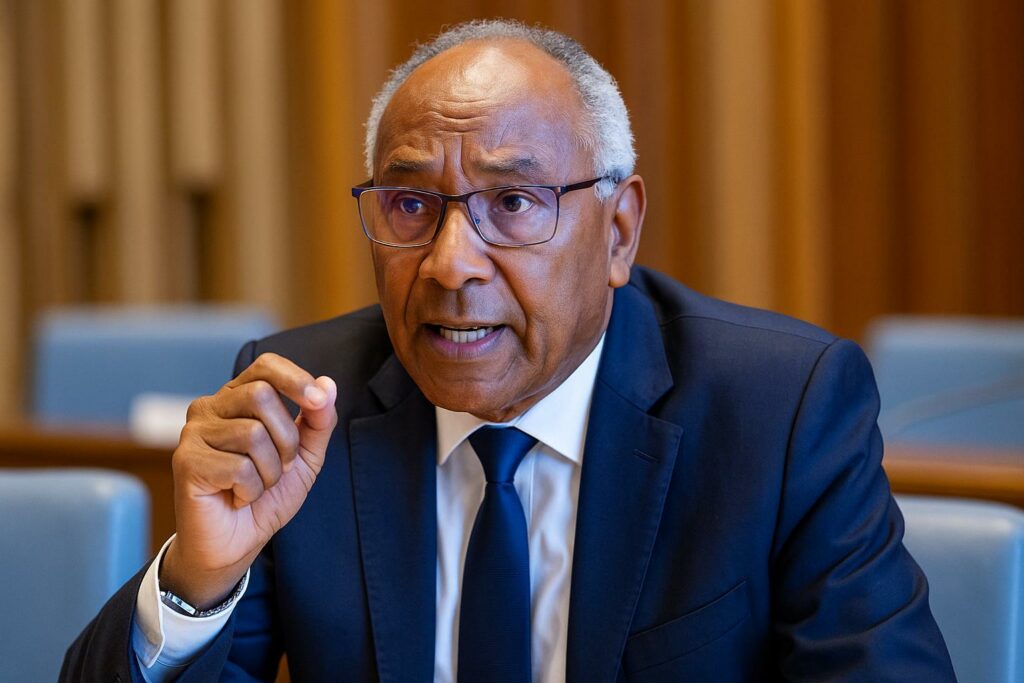Gulf Capitals Spotlight Brazzaville’s Renewed Activism
In the space of forty-eight hours, Minister of International Cooperation and Public-Private Partnership Denis Christel Sassou Nguesso has threaded together high-level meetings in Muscat, Doha and Kuwait City. The objective is unambiguous: consolidate a critical mass of endorsements for Firmin Édouard Matoko, Brazzaville’s official nominee to succeed Audrey Azoulay at the helm of the United Nations Educational, Scientific and Cultural Organisation. By staging its campaign in the Gulf, Congo signals both a determination to diversify diplomatic alliances and an appreciation for the pivotal role Middle Eastern members play within UNESCO’s Executive Board.
Speaking in Muscat, the minister framed the tour as “an illustration of Congo’s commitment to multilateral cooperation centred on education, science and culture”. His interlocutors reciprocated with carefully worded assurances that the Congolese dossier would receive “serious and sympathetic consideration” within their respective delegations, according to communiqués published by the three foreign ministries.
Muscat: Oman’s Strategic Prudence
The opening leg in Oman provided the first gauge of regional receptiveness. Foreign Minister Badr Albusaidi, whose country has cultivated a reputation for discreet yet influential diplomacy, welcomed what he termed “a candid exchange on UNESCO’s future and the value of an African candidature”. Omani officials, attentive to maintaining equidistance among competing bids, underlined procedural rigour and hinted that endorsements would follow a collective evaluation within the Arab group at UNESCO (official communiqué, 8 September).
For Brazzaville, even such cautious language is valuable. It suggests that Matoko’s profile has entered serious deliberations, a prerequisite for gaining momentum ahead of the decisive Executive Board vote scheduled for 6 October 2024.
Doha: Harnessing Qatar’s Convening Power
In Doha on 9 September, Denis Christel Sassou Nguesso met Minister of State for Foreign Affairs Dr Mohammed Bin Abdulaziz Al-Khulaifi. The Qatari side emphasised its longstanding investment in UNESCO programmes, notably in education for displaced populations, and acknowledged the “convergence of priorities” with Matoko’s platform. Observers note that Qatar’s diplomatic network and its financial engagement in multilateral agencies often shape voting dynamics well beyond the Arab bloc. A discreet understanding from Doha can therefore reverberate across Asia and Latin America.
Kuwait City: Presidential Missive Carries Political Weight
The Kuwaiti stopover on 8 September served a dual purpose. Beyond protocol courtesies, the minister handed a sealed message from President Denis Sassou Nguesso to Emir Sheikh Meshaal Al-Ahmad Al-Jaber Al-Sabah, relayed through Foreign Minister Abdullah Ali Al-Yahya. Diplomatic sources in Kuwait City describe the letter as a personal appeal anchored in the historical friendship between the two states and in their shared advocacy for South-South cooperation.
Kuwait’s voice inside UNESCO has gained visibility since its successful bid to host major cultural forums. An endorsement, even tacit, would amplify Brazzaville’s argument that Matoko embodies an inclusive vision capable of bridging African and Arab constituencies.
UNESCO’s Electoral Mechanics and Calendar
The Director-General is recommended by UNESCO’s 58-member Executive Board and subsequently appointed by the General Conference for a four-year term, renewable once. The current timeline projects the Board’s secret ballot for 6 October 2024, ahead of the 43rd General Conference slated for 30 October to 13 November 2025 in Samarkand. Congo’s campaign team therefore operates within a compressed window where early pledges can crystallise voting blocs before formal candidatures are even finalised.
The only declared rival so far is Egypt’s Khaled El-Enany, former Minister of Tourism and Antiquities, whose profile appeals to constituencies keen on archaeological diplomacy. A two-horse race increases each side’s margin for alliance-building, transforming every handshake in Muscat, Doha or Kuwait City into a potential swing vote.
Matoko’s Trajectory: From UNESCO Insider to Reform Advocate
Firmin Édouard Matoko, currently Assistant Director-General for Priority Africa and External Relations, brings three decades of institutional memory. His stewardship of programmes aimed at youth empowerment and digital literacy in sub-Saharan Africa secures him credibility among developing countries. Congolese officials also highlight his tenure in Paris headquarters, arguing that it equips him “to reconcile innovation with continuity”.
Analysts interviewed in Brazzaville stress that Matoko’s candidacy resonates with the African Union’s Agenda 2063, particularly its cultural renaissance pillar, while aligning with Gulf states’ diversification strategies in knowledge economies.
Geopolitical Stakes for Brazzaville
Congo’s vigorous lobbying transcends personal ambition. A successful bid would elevate the country’s soft-power quotient, reinforcing President Denis Sassou Nguesso’s doctrine of pragmatic multilateralism. It would also anchor Central Africa more firmly within global norm-setting arenas, offering fresh leverage on education financing and heritage conservation.
Legal experts note that UNESCO leadership provides limited executive latitude yet substantial agenda-setting influence. For Brazzaville, guiding that agenda could translate into stronger advocacy for climate-resilient schooling and the preservation of Congo Basin ecosystems—issues intertwined with national development plans.
What Comes Next
Minister Denis Christel Sassou Nguesso’s Middle Eastern swing will reportedly be followed by consultations in Asia and Latin America, underscoring the worldwide scope of the canvassing effort. In the meantime, diplomatic missions in Paris will intensify technical briefings for Executive Board members, while Matoko himself refines a manifesto expected to be unveiled in early 2024.
As the calendar advances, each supportive capital adds incremental legitimacy to Brazzaville’s bid. The Gulf tour may thus prove not merely symbolic but structurally consequential, positioning Congo as a proactive stakeholder in the governance of culture and knowledge on the global stage.

